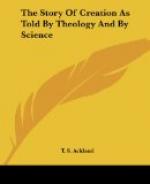First of all it is desirable to dispose of one of the stock arguments in favour of the theory. That argument is, that the difference between the lowest type of savage and the highest type of civilized man—between a Fuegian or an Australian on the one hand, and a Newton, a Shakspeare, or a Humboldt, on the other,—is quite as great as that between the higher forms of ape and the lowest forms of humanity. But in this argument there is a fatal confusion of ideas. The capacity for acquisition is confounded with the opportunity for acquisition. That the savage is in possession of but very few ideas does not prove that he is incapable of more; it may equally well arise from the fact that he had had no opportunity of acquiring more. The only way to test the question is by putting a savagoe from his earliest infancy, under the same favourable circumstances as the child of civilisation. Whenever this experiment has been tried, and our missionaries have had many opportunities of trying it, the difference has either not appeared at all, or has proved to be very trifling. Mr. Darwin himself seems to have been very much surprised at what he saw in some natives of Terra del Fuego, who were for a time his companions on board the “Beagle.” “The Fuegians rank amongst the lowest barbarians, but I was continually struck with surprise how closely the three natives on board H.M.S. ‘Beagle,’ who had lived some years in England, and could talk a little English, resembled us in disposition, and in most of our mental faculties.” [Footnote: Descent of Man, vol. i. p 34] And these Fuegians had not been educated from their infancy, they had only come to England later in life, and were thus under an incalculable disadvantage. Had they been heirs to such an intellectual inheritance as fell to the lot of Mr. Darwin, there is nothing extravagant in the supposition that they might have proved themselves equal to him in the ability to make use of it. The comparison then proves to be quite illusory; but it draws our attention to a fact which is of very high importance in our investigation of the difference between man and all other animals. Man alone seems to be capable of laying up what may be termed an external store of intellectual wealth. Other animals in the state of nature make, so far as we know, no intellectual advances. The bee constructs its cell, the bird builds its nest precisely as its progenitors did in the earliest dawn of history. There is a possibility that some advance, though a very small one, may be made by animals brought under the control of man. It is said, for instance, that a young pointer dog will sometimes point at game without any training. But in this case the acquired knowledge is congenital, and is therefore to be regarded as a development brought about by superintended selection. But with man none of the acquired knowledge is innate. It is a treasure entirely external to himself until he has appropriated it by study of some kind or other.




